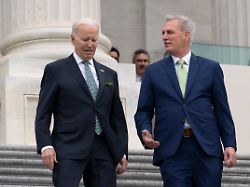USA threatens next shutdown
Biden blames “extreme Republicans” in budget dispute
September 24, 2023, 10:28 a.m
Listen to article
This audio version was artificially generated. More info | Send feedback
In talks with the Republican leader of the House of Representatives, McCarthy, US President Biden reached an agreement in the dispute over the trillion-dollar federal budget. A budget freeze appears to have been averted. But his own MPs do not follow McCarthy.
US President Joe Biden has blamed “a small group of extreme Republicans” for an impending budget freeze. Biden said he had reached an agreement in talks with House Republican leader Kevin McCarthy. “Now a small group of extreme Republicans don’t want to keep the agreement,” criticized Biden. “Everyone in America has to pay the price.”
The US Congress must pass a new budget law by midnight on September 30th to secure funding for federal authorities. If Republicans and Democrats cannot agree, there will be a budget freeze, the so-called shutdown. Then hundreds of thousands of state employees will have to be sent on unpaid leave and numerous public institutions such as museums and national parks will have to be closed.
For Biden, who wants to run for a second term in the White House next year, a shutdown would also be politically fatal. “Funding the government is one of the most important tasks of Congress,” warned the US President. “It’s time for Republicans to start doing the job America elected them to do.”
Controversy over Ukraine aid
Republicans and Democrats regularly engage in tough battles over budget issues. This time an agreement is particularly difficult because control of Congress is divided: the Democrats have the majority in the Senate, the Republicans have had the majority in the House of Representatives since the congressional midterm elections in autumn 2022.
The White House wants to ensure that the budget law also contains new aid for Ukraine amounting to $24 billion (around 22.5 billion euros). Democrats and Republicans in the Senate support the plan, but there is resistance from Republican ranks in the House of Representatives. The right-wing wing of the party in particular argues that the money should be better invested in the USA.
